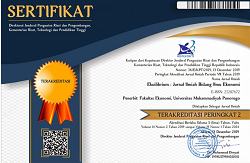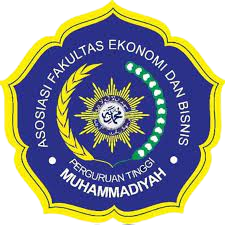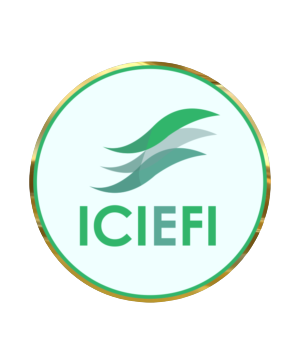The Effect of Control Corruption, Political Stability, Macroeconomic Variables on Asian Economic Growth
DOI: 10.24269/ekuilibrium.v15i2.2020.pp161-169
Abstract
This study aims to analyze the correlation between control corruption and political stability, macro variables on economic growth in Asia. Study population consist of 47 countries, employing secondary data from Worldwide Governance Indicators, World Development Indicators, and United Nations Development Programme. The data were analyzed using dynamic panel regression (GMM) during 2002-2018 period with Stata 14 software. The result of the analysis shows control corruption and political stability positively affect economic growth. Macroeconomic variables consist of foreign direct investment and human capital positively affects economic growth. While government size has no significant effect on economic growth. The findings of this study confirms that economic growth can be increased through reducing levels of corruption, strong political stability, increase capital inflow, optimally government consumption especially increasing portion of the education budget and creating jobs widely.
Keywords
References
- Adefeso, H. (2018). Corruption, political instability and development Nexus in Africa: A call for sequential policies reforms. Munich Personal RePEc Archive, 85277(1), 1-15.
- Albulescu, C. T. (2015). Do Foreign Direct and Portfolio Investments Affect Long-term Economic Growth in Central and Eastern Europe? Procedia economics and finance, 23, 507-512.
- Aleksandrovich, A., & Upadhyaya, K. P. (2015). Government size and economic growth: evidence from selected OECD countries. International Journal of Economics and Finance, 7(5), 38-43.
- Altunc, O. F., & Aydın, C. (2013). The relationship between optimal size of government and economic growth: Empirical evidence from Turkey, Romania and Bulgaria. Procedia-Social and Behavioral Sciences, 92, 66-75.
- Cieślik, A., & Goczek, Ł. (2018). Control of corruption, international investment, and economic growth–Evidence from panel data. World Development, 103, 323-335.
- Delgado, M. S., Henderson, D. J., & Parmeter, C. F. (2014). Does education matter for economic growth? Oxford Bulletin of Economics and Statistics, 76(3), 334-359.
- Feeny, S., Iamsiraroj, S., & McGillivray, M. (2014). Growth and foreign direct investment in the Pacific Island countries. Economic Modelling, 37, 332-339.
- Mankiw, N. G. (2012). Macroeconomics (5th edition ed.). New York: Worth Publishers.
- Nurudeen, A., Abd Karim, M. Z., & Aziz, M. I. (2015). Corruption, political instability and economic development in the Economic Community of West African States (ECOWAS): is there a causal relationship? Contemporary economics, 9(1), 45-60.
- Ogundari, K., & Awokuse, T. (2018). Human capital contribution to economic growth in Sub-Saharan Africa: does health status matter more than education? Economic Analysis and Policy, 58, 131-140.
- Omoteso, K., & Mobolaji, H. I. (2014). Corruption, governance and economic growth in Sub-Saharan Africa: a need for the prioritisation of reform policies. Social Responsibility Journal, 10(2), 316-330.
- Papaconstantinou, P., Tsagkanos, A. G., & Siriopoulos, C. (2013). How bureaucracy and corruption affect economic growth and convergence in the European Union—The case of Greece. Managerial Finance, 39(9), 837-847.
- Sari, D. W. (2012). Studi Pemetaan Wilayah Tertinggal Di Indonesia. Majalah Ekonomi Universitas Airlangga, 22(1), 4136.
- Shabbir, G., Anwar, M., & Adil, S. (2016). Corruption, political stability and economic growth. The Pakistan Development Review, 55(4), 689-702.
- Shumetie, A., & Watabaji, M. D. (2019). Effect of corruption and political instability on enterprises’ innovativeness in Ethiopia: pooled data based. Journal of Innovation and Entrepreneurship, 8(1), 11.
- Teixeira, A. A., & Queirós, A. S. (2016). Economic growth, human capital and structural change: A dynamic panel data analysis. Research policy, 45(8), 1636-1648.
- Todaro, M. P., & Smith, S. C. (2012). Economic development (11th edition ed.). Boston: Pearson.
- United Nations Development Programme (UNDP). (2019). Human Development Data (1990-2018).
- Verbeek, M. (2012). A Guide to Modern Econometrics (5th Edition ed.). West Sussex: Chichester: John Wiley & Sons, Ltd., Publication.
- Wahab, A. A., Iskandar, R., & Irwansyah, I. (2016). Influence of government investment and private investment and labor against domestic product gross regional and own local revenue samarinda. INOVASI, 12(2), 163-178.
- Winanto, A. R. (2016). Pengaruh Tenaga Kerja Indonesia dari Ponorogo terhadap PDRB Kabupaten Ponorogo. Ekuilibrium: Jurnal Ilmiah Bidang Ilmu Ekonomi, 10(1), 59-68.
- Winanto, A. R. (2019). Investment, Labor, and Their Effects on Economic Growth of Ponorogo Regency. Ekuilibrium: Jurnal Ilmiah Bidang Ilmu Ekonomi, 14(1), 68-83.
- Wintoki, M. B., Linck, J. S., & Netter, J. M. (2012). Endogeneity and the dynamics of internal corporate governance. Journal of financial economics, 105(3), 581-606.
- World Bank. (2019a). Agregate Indicators of Governance 2002-2018.
- World Bank. (2019b). World Development Indicators Database Online.
Refbacks
- There are currently no refbacks.

This work is licensed under a Creative Commons Attribution-ShareAlike 4.0 International License.













